 Petzlover
Petzlover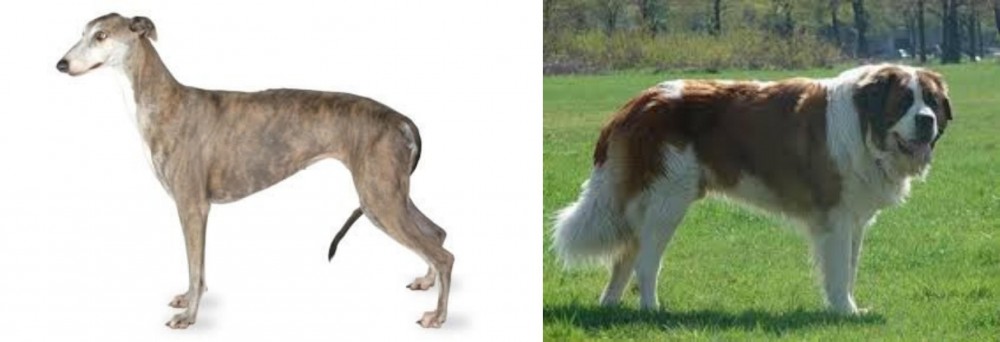 Greyhound is originated from United Kingdom but Moscow Watchdog is originated from Russia. Greyhound may grow 7 cm / 3 inches higher than Moscow Watchdog. Greyhound may weigh 28 kg / 61 pounds lesser than Moscow Watchdog. Greyhound may live 3 years more than Moscow Watchdog. Both Greyhound and Moscow Watchdog has almost same litter size. Greyhound requires Low Maintenance. But Moscow Watchdog requires Moderate Maintenance
Greyhound is originated from United Kingdom but Moscow Watchdog is originated from Russia. Greyhound may grow 7 cm / 3 inches higher than Moscow Watchdog. Greyhound may weigh 28 kg / 61 pounds lesser than Moscow Watchdog. Greyhound may live 3 years more than Moscow Watchdog. Both Greyhound and Moscow Watchdog has almost same litter size. Greyhound requires Low Maintenance. But Moscow Watchdog requires Moderate Maintenance
 The Greyhound belongs to a group of dogs known as sighthounds. This is an ancient sighthound breed dating back a few thousands years.
The Greyhound belongs to a group of dogs known as sighthounds. This is an ancient sighthound breed dating back a few thousands years.
The dog has been bred for racing but today is also a popular pet. They’ve also been used for hunting too because of their keen eyesight and sense of smell.
In the United States there are Greyhounds registered with the American Kennel Club as well as those registered with the National Greyhound Association.
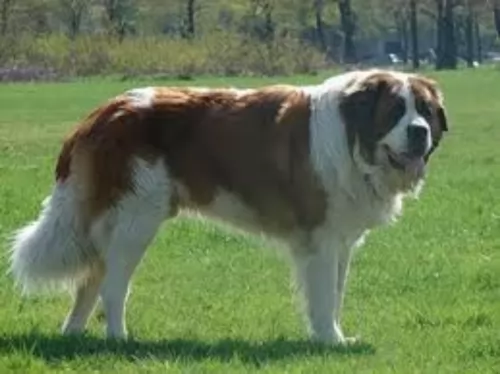 The Moscow Watchdog is a cross between the Caucasian Oytcharka, the St. Bernard and other Russian hound dogs. This large breed dog was developed in the Soviet Union for the purpose of being guard dogs. It had the awareness and assertiveness of the Oytcharka and the size, intelligence and attractiveness of the St. Bernard. The breed is common in Russia today but hardly seen anywhere else even though they were exported to the United States and Europe. The breed had the first U.S. born litter in 2015 and it is not AKC recognized.
The Moscow Watchdog is a cross between the Caucasian Oytcharka, the St. Bernard and other Russian hound dogs. This large breed dog was developed in the Soviet Union for the purpose of being guard dogs. It had the awareness and assertiveness of the Oytcharka and the size, intelligence and attractiveness of the St. Bernard. The breed is common in Russia today but hardly seen anywhere else even though they were exported to the United States and Europe. The breed had the first U.S. born litter in 2015 and it is not AKC recognized.
Following the second world war crime was on the rise in the Soviet Union and a new breed of dog was needed to counter this trend. The dog had to be adaptable to very cold temperatures, snowy weather and have a guard dog personality and ability. The breed was called on to guard such locations as railroads, government offices, warehouses, infrastructure and labor camps.
The project to develop this breed was led by General Medvedev beginning in 1946 at the Central School of Military Kynology – which was a department of the Soviet Ministry of Defense. It took many years to develop the Moscow Watchdog which then became a very successful breed.
It took until 1985 for the breed to be “officially” recognized in the Soviet Union and until 1992 to be recognized by the Federation of Dog Breeders in Russia and until 1997 for the standard to be approved by the Russian Kennel Club. They are still working with the FCI to gain international recognition for the breed. At the moment they are considered a part of the Molosser group and shown in the “Special Show” in Russia.
Committed breeders brought the Moscow Watchdog to Hungary in 1986 in order to make the breed more popular. In addition to this there were many breeders from previous Soviet States that wanted to preserve the breed as well. There were about 500 Moscow Watchdogs in Hungary around then. Currently there are about 27 Moscow Watchdogs in the United States. The breed is known to be a gentle giant and very much a family dog these days.
 The Greyhound is a tall, muscled, long-legged, slender dog with a flexible spine, a deep chest and exceptional eye sight.
The Greyhound is a tall, muscled, long-legged, slender dog with a flexible spine, a deep chest and exceptional eye sight.
The Males are usually about 71 to 76 cm in height with the females being slightly smaller. The dogs weigh in the region of 27 to 40 kg. The coat of the dog is short and smooth and is found in an assortment of colors, from fawn to white, tan, black and brindle.As far as grooming goes, he is looked upon as a low maintenance breed.
He has a long narrow muzzle, semi-erect/semi-floppy short ears and a long slender tail.
Sometimes referred to as being hypoallergenic, you need to allow your Greyhound indoors as the dog doesn't have an undercoat. He is therefore more susceptible to extreme temperatures. The face is long, narrow and pointed, the ears short and half-erect-half-floppy with a long, thin, whip-like tail.
Intelligent and gentle, the Greyhound is described by those who have owned them as wonderful pet. They are somewhat aloof around strangers but love their own human family. This is a non-aggressive, gentle, docile, calm dog. They are loving and get on well with their entire family, whether human beings or pets.
They’re sensitive dogs who appreciate quiet, calm environments. They may be quiet, but they are still social, loving the company of their family. They’re not great barkers and because they are non-aggressive, they don’t make wonderful guard dogs.
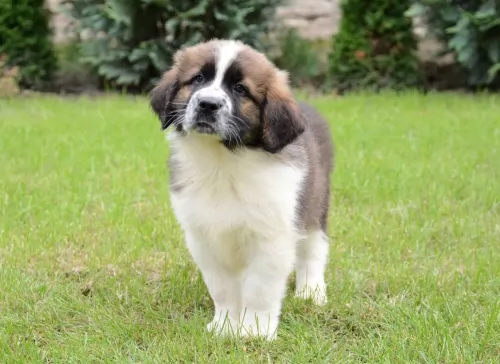 The Moscow Watchdog is related to the mountain dogs and is a very large breed. They are sturdy, muscular and powerful. They have big heads and a thick double coat that sheds profusely four times a year. They have a long tail, an arched chest and an air of confidence.
The Moscow Watchdog is related to the mountain dogs and is a very large breed. They are sturdy, muscular and powerful. They have big heads and a thick double coat that sheds profusely four times a year. They have a long tail, an arched chest and an air of confidence.
He is in the Mastiff family and is smart and trainable. He is not clumsy but has big bones. He is surprisingly agile and active for a dog his size. Unlike the St. Bernard he is not a couch potato. He is also differentiated from the St. Bernard because he does not drool.
These dogs are large but they’ve got a gentle temperament and are good with kids, being playful and energetic with them.
Even though he is a docile dog, you want him trained and socialized, and then he gets along well with other pets too. His sheer size makes it that it is best to supervise him when he’s around small children. He is also a protective dog breed, willing to bond closely to, and protect his human family.
 The Greyhound, forgetting about the racing part, makes a superb pet too. He won't do well in a household where there are screaming, noisy children and adults as he wants a quiet home to live in.
The Greyhound, forgetting about the racing part, makes a superb pet too. He won't do well in a household where there are screaming, noisy children and adults as he wants a quiet home to live in.
He can get on well with kind, gentle, respectful children as well as with pets in the home. Just like any dog, he will also need training and socialization as this can build up his confidence and then he knows how to please his owners and what they expect.
The Greyhound will require a gentle, fair, kind owner who understands his need for peace and quiet, and then he becomes a most wonderful devoted, loyal and loving pet.
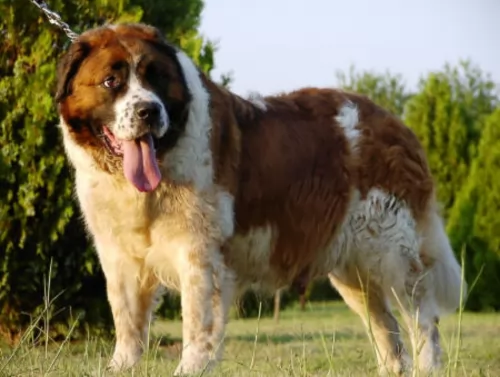 This is a large dog who likes to be involved and busy, even though he is so big. He isn’t suited to city life and being confined to a tiny garden as he needs space.
This is a large dog who likes to be involved and busy, even though he is so big. He isn’t suited to city life and being confined to a tiny garden as he needs space.
They’re independent dogs too and you can leave them alone during the day. He is social, so while you can leave them during the day while you’re at work, he’ll want your attention when you get back. They're such loving, loyal family pets that you owe it to him to make this gentle giant of a dog as happy as can be.
 Greyhounds are a wonderfully healthy dog breed and with good care can reach 14 years of age. They aren't prone to many genetic illnesses and unlike so many other dog breeds, this is one dog that doesn't battle with hip dysplasia – in fact it is almost unknown among this tall, slim dog breed.
Greyhounds are a wonderfully healthy dog breed and with good care can reach 14 years of age. They aren't prone to many genetic illnesses and unlike so many other dog breeds, this is one dog that doesn't battle with hip dysplasia – in fact it is almost unknown among this tall, slim dog breed.
The Greyhound does however, have a deep chest and this is what makes him vulnerable to bloat or gastric torsion. You have to take action quickly if you detect bloat – the stomach swells up – as this is a life-threatening condition that can occur quickly when air is trapped in the stomach. The stomach can become twisted.
Make sure your Greyhound doesn't gobble his food too quickly and preferably give him smaller meals as opposed to one or two large bowls of food.
 Moscow Watchdog is looked upon as a fairly healthy dog breed but there are some risks such as hip dysplasia as well as some other large breed problems.
Moscow Watchdog is looked upon as a fairly healthy dog breed but there are some risks such as hip dysplasia as well as some other large breed problems.
With big dogs like this, hip dysplasia is a threat. Its an hereditary condition where the parent dogs pass down the problematic genes. Hip dysplasia results in inflammation and pain for your pet, and where once he loved to play, he is reluctant to and battles to get up after lying down.
 Your Greyhound’s breeder will be the best guide for the type of- and the amount of dog food your hound will need. Of course, a growing puppy has different nutritional needs from a mature or senior Greyhound.
Your Greyhound’s breeder will be the best guide for the type of- and the amount of dog food your hound will need. Of course, a growing puppy has different nutritional needs from a mature or senior Greyhound.
Growing puppies and young dogs use a lot of energy so they will require a diet rich in protein. According to Greyhound experts, an adult Greyhound dog will need an average daily caloric intake of 1740 calories.
Older dogs and those that have been spayed or neutered will need less. Apart from the very best quality kibble, your Greyhound will most certainly require raw meat from time to time. You can also give him some cooked chicken, vegetables and brown rice. He should have access to a constant supply of fresh, cool water.
The Greyhound's coat is smooth and short and he sheds very little so he will only need a gentle brush-down once or twice a week.
Having a relaxed lifestyle is what your Greyhound will love. He is a dog that needs to spend time indoors. When outdoors, whether you live in the city or the country, he will need daily walks and a run in the park regularly.
Just because he is a sprinter, it isn't wise to take him with you with cycling or jogging as he is geared for a short burst of speed as opposed to a long run.
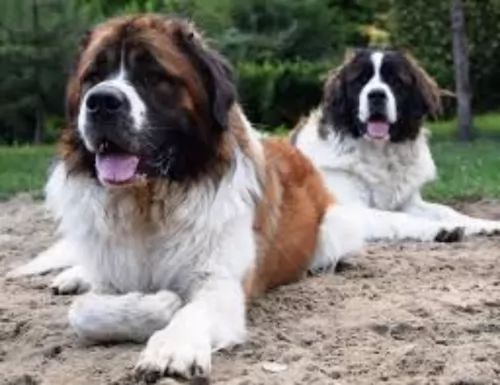 The Moscow Watchdog is a giant sized dog and will require a lot of regular exercise, and apart from a fairly brisk daily walk, will also need games and a run in the park.
The Moscow Watchdog is a giant sized dog and will require a lot of regular exercise, and apart from a fairly brisk daily walk, will also need games and a run in the park.
As a large dog requiring a regular dose of physical exercise as well as mental stimulation, he is better suited to life in the country or at least where there is a large garden.
The Moscow Watchdog has a medium length coat, and as a moderate shedder, you will need to simply brush his coat twice a week to remove loose hair. There is no professional grooming required for these dogs.
Homemade food is always a treat for a dog, but if you’re feeding your Moscow Watchdog commercially manufactured food because of the sheer convenience it provides, make sure the packaging says 'large- or giant dog breed' food. This way you know your pet is getting the right amount of minerals and vitamins for his size.
Always buy the best quality food to avoid giving your pet an overdose of colorants and preservatives. Try and give your pet some home-made food such as boiled chicken, some brown rice or pasta and some cooked vegetables such as sweet potatoes, carrots and spinach. These can be added to his kibble every now and again.
A simple diet like this agrees with your pet and he will be healthy and happy with his lot.